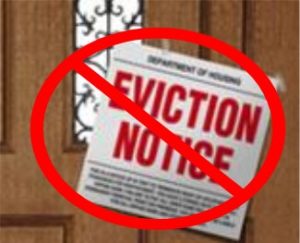
LOS ANGELES – The Los Angeles County Board of Supervisors Tuesday extended a moratorium on evictions through June 30 and voted to consider a wide variety of tenant and homeowner protections in reaction to the coronavirus crisis.
The extension of the moratorium on evictions of commercial and residential tenants countywide fell two months short of the goal set by Supervisor Sheila Kuehl.
Without such a ban, “those who can be evicted will be out on the street,” Kuehl warned.
Kuehl said she chose an August 31 date based on guidance from the Department of Public Health.
However, Supervisor Kathryn Barger pushed for an amendment setting the end date at June 30, just one month more than currently mandated, and directing the board to re-evaluate the moratorium every 30 days after that.
Barger said she supports solutions for constituents who are “struggling to put food on the table,” but also wants to see support for landlords and “individuals at every single level of the housing chain.”
Supervisor Hilda Solis, who co-authored the motion with Kuehl, ultimately agreed to Barger’s amendment, which passed on a 3-2 vote.
Landlords argued against the ban. A representative of the Building Owners and Managers Association of Greater Los Angeles said he spoke for the owners and managers of 135 million square feet of properties contributing $3.5 billion to the California economy who he said want to be part of the solution and are committed to working with tenants.
“We appreciate the intention” of the motion, BOMA/GLA’s Aaron Taxy told the board. However, solutions “should not come disproportionately to cripple our own business.”
Taxy said some members had lost 70% or more of their rental income.
One woman said the moratorium would work to undo all that her immigrant parents had achieved and force them to sell “bread-and-butter buildings that have provided affordable housing” for more than 30 years.
The eviction ban will be implemented through an executive order by the county’s CEO, who leads the emergency response to the coronavirus crisis. In addition to unincorporated areas of the county, it will apply to cities without moratoriums of their own.
Based on a separate motion by Supervisors Janice Hahn and Mark Ridley-Thomas, commercial tenants that are multi-national, publicly traded or have more than 100 employees will no longer be protected from eviction under the order. Smaller commercial tenants with 10-100 employees will have just six months to pay back rent, unless they strike a separate deal with their landlords, as compared with a 12-month repayment period for residential tenants.
The board also voted to send a letter to state and federal legislators supporting comprehensive rent and mortgage relief related to the COVID-19 crisis.
“We are facing a public health crisis that is upending the lives of hardworking families, many of whom live from paycheck-to-paycheck. This unprecedented global pandemic requires unprecedented actions to protect vulnerable families who are on the brink of homelessness,” Solis said.
The board also directed various departments to research and analyze other ways to support tenants, homeowners and landlords, calling for reports within 45 days.
Such measures could include:
— data sharing to identify where residents and businesses are being displaced;
— counseling and referrals to foreclosure prevention services;
— deferring collection of property taxes and clean energy tax assessments for 12 months;
— cracking down on predatory lenders targeting low-income homeowners; and
— a right-to-purchase program that would allow affordable housing developers or nonprofit organizations to buy foreclosed properties ahead of large-scale corporate purchasers, including county funding for such purchases.
–